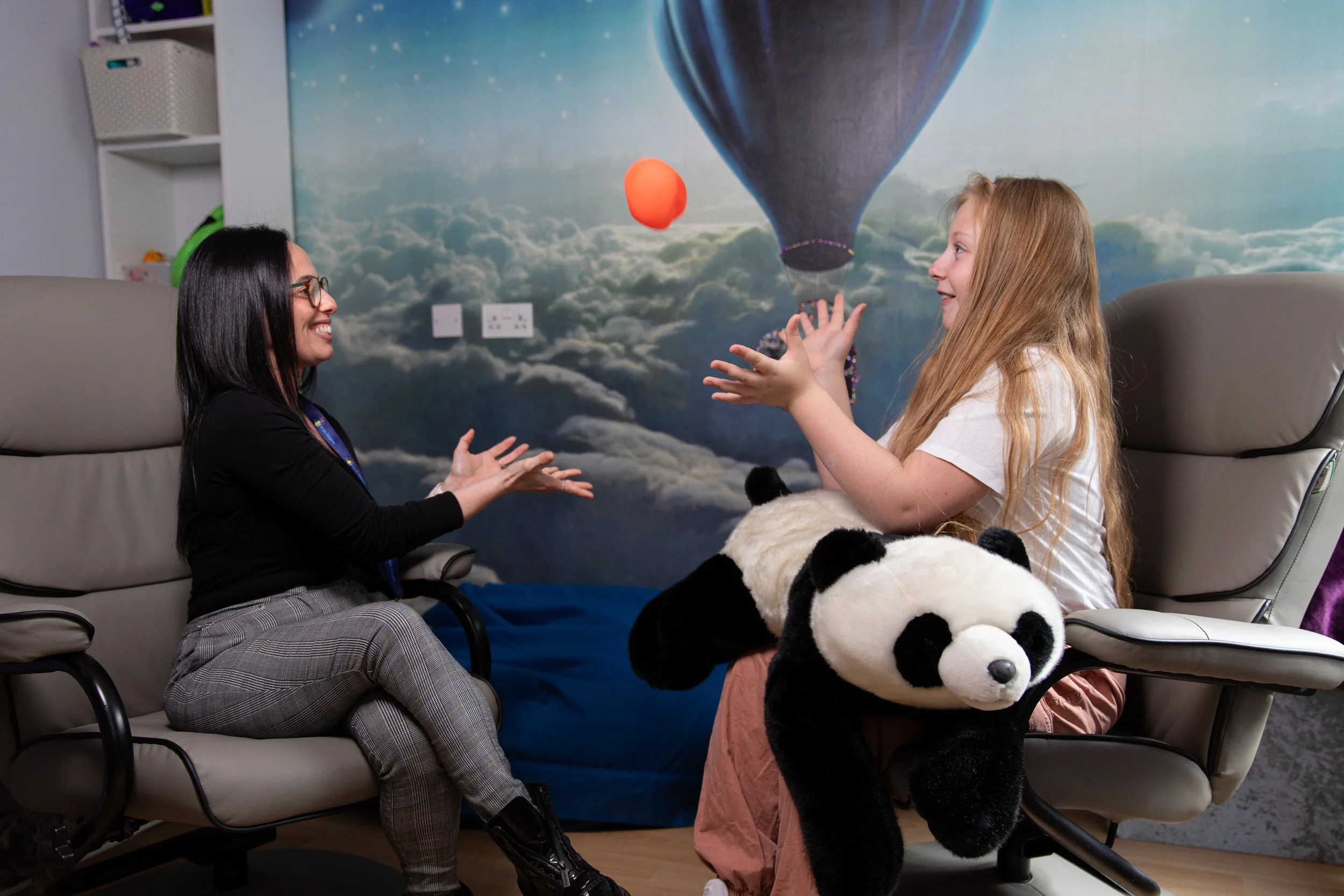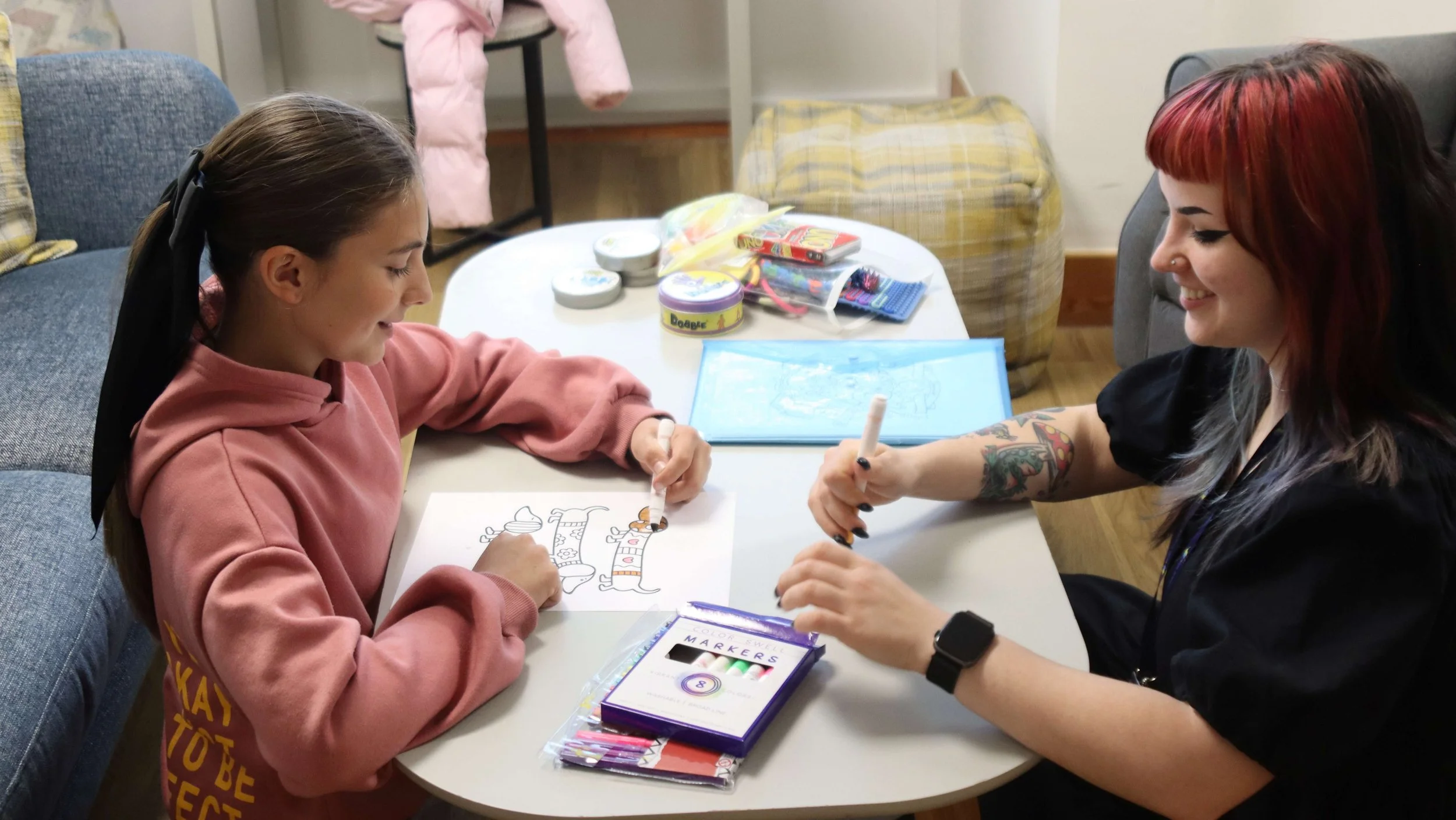Conference workshops
Explore a series of reflective, skills-based workshops designed to strengthen your practice and deepen your understanding of children’s mental health.
Our Beyond Behaviour: understanding trauma and neurodivergence conference offers a thoughtfully designed programme of workshops exploring key themes in trauma, neurodiversity, communication, and emotional wellbeing.
Each session provides space to reflect, share learning, and build practical strategies for supporting children, young people, and families.
Led by experienced practitioners, these workshops invite you to deepen your understanding, enhance confidence, and develop approaches grounded in compassion and evidence-based practice.
Workshops
Beyond tired: understanding neurodivergent burnout
Time: 10:45-11:45am
Burnout can impact a child's education, physical and emotional mental health.
Burnout can lead to extreme fatigue, increased meltdowns/shutdowns, loss of skills, increased sensory sensitivities, and loss of interest in activities that previously brought enjoyment.
This workshop will cover:
the importance of understanding and recognising neurodivergent burnout
possible causes of neurodivergent burnout and how this presents
the impact of school burnout and the subsequent impact on the young person’s emotional well-being
strategies for energy management to foster healing and recovery
Workshop participants will have the opportunity to explore sensory soothing kits and create a sensory item to take away.
Sensory child-centred interventions for neurodiversity
Time: 10:45-11:45am
For many children, especially those who are neurodivergent, sensory experiences are a powerful tool to encourage regulation.
When children are overwhelmed or dysregulated, activities like tactile play, movement, or creative expression can offer a way back to calm.
This workshop invites you to explore:
practical ways to create a mini sensory toolkit.
the importance of different sensory activities.
how to use the gingerbread body outline in your practice to encourage awareness of body sensations and feelings
the concept of the “window of tolerance” and how it applies to children’s energy and emotions
This is a hands-on session, and is designed to spark ideas you can bring straight into your classroom or practice.
PACE-ing the Spectrum: Using principles from Dyadic Developmental Psychotherapy and the PACE model to deepen relational understanding of autism
Time: 11:55am-12:55pm
Dyadic Developmental Psychotherapy (DDP) is widely recognised for supporting children and families affected by trauma. But what happens when a child is both autistic and has experienced trauma?
One of eleven workshops it will explore how to adapt the principles of PACE (Playfulness, Acceptance, Curiosity and Empathy) when working with autistic children, including those with ADHD.
You will gain:
an understanding of how trauma and autism interact
strategies for flexibly applying DDP in a neurodiverse context
practical ways to use PACE to build safety, trust, and connection
An essential opportunity to deepen your practice.
Bridging the Gap – supporting neurodivergent children through educational transitions
Time: 11:55am-12:55pm
Transitions are part of every child’s life – starting school, moving between classes, or preparing for adulthood. But for neurodivergent children, even small changes can feel overwhelming.
This workshop will cover:
practical strategies to prepare and support children through change
tools to reduce anxiety and increase predictability
ways to involve families in creating smoother transitions
why transitions can be particularly challenging for autistic children and those with ADHD
By the end of the session, you will have learnt practical approaches to reduce stress and build resilience for the children you support.
Communication difficulties: overcoming barriers to children being understood, getting their needs met; improving emotional wellbeing and behaviours.
Time: 1:30-2:30pm
Did you know 10% of children in every classroom have communication difficulties?
These challenges are often invisible – but they can have a detrimental and long-lasting impact affecting behaviour, relationships, and wellbeing.
We will cover:
how communication differences show up in practice and how to recognise these difficulties
using creative tools to support young people and families to facilitate and encourage communication and understanding
why these difficulties are often missed or misunderstood
Delivered by experienced practitioners, this session will give you the confidence to identify and effectively support children whose communication differences may otherwise go un-noticed and un-supported.
R & R – Regulate to relate: Embodied self-regulation for helping professionals
Time: 1:30-2:30pm
Working with children and young people means bringing your whole self into the room. How often do we notice and become aware of our own internal system of regulation and the opportunities this offers to foster co-regulated and relationally attuned connections?
Explore:
embodied self-regulation
how your own regulatory system influences co-regulation
practical tools to develop emotional resilience and how to develop co-regulated, safe and responsive spaces for children and young people.
If you support neurodivergent young people and their families or those that have experienced trauma, this is your chance to gain a deeper understanding, build awareness and develop strategies that can really make a difference.
Welcoming neurodivergent culture and communication – creating nurturing spaces together
Time: 2:40-3:40pm
What makes a truly safe and welcoming space for neurodivergent children, young people, and adults?
You will have the chance to consider:
how deep interests, sensory preferences and communication can influence and shape safe spaces
how our own communication styles can influence access to support
practical ways to effectively co-create adjustments that are empowering and supportive for the children and families we support
Participants will also reflect on designing inclusive spaces – from classrooms to workplaces – and leave with self-advocacy tools and ideas for nurturing change.
Unmasking Neurodivergence in Girls and Women
Time: 2:40-3:40pm
Autism in girls and women has for many years been overlooked and underdiagnosed, leading to misdiagnoses, missed opportunities to access appropriate and timely support and vital chances to foster and develop self-understanding.
Traits often present differently in women and girls and as such do not always follow the stereotypical signs of autism often picked up earlier in males.
This workshop will explore:
why autism is so often overlooked in girls and women and explore the key differences
how we can approach assessment and diagnosis through a gender sensitive lens
how to support families who are trying to access support and the barriers they may experience
Participants will gain insights to help identify and support autistic girls and young women earlier – ensuring their needs are recognised and understood.
Making sense of behaviour and developmental trauma
Time: 5-6pm
For children and young people who have experienced developmental trauma, behaviour can be a vital form of communication – signalling distress, unmet needs, or a call for connection.
This workshop will cover:
how trauma can shape behaviour at a young person’s different developmental stages
concepts from the Neurosequential Model of Therapeutics (NMT©) and sensory assessments
the importance of recognising behaviour as communication, not ‘poor behaviour’
practical tools for understanding what a child may be seeking through their actions
Using psychoeducation and NMT to guide interventions which are best suited to support children with this complex presentation
Ideal for anyone working with children of all ages
Food, sleep and the hidden foundations of neurodivergent wellbeing
Time: 5-6pm
(This was previously ‘Understanding sleep in neurodivergent children’)
Explore how nourishing the body and supporting sleep can reduce anxiety, boost regulation and transform mental health for neurodivergent children.
In this practical and insight-rich workshop, we will look beyond behaviour to understand the powerful connections between the body and the mind in neurodivergent children and young people.
Drawing on current evidence and frontline clinical experience, this session will explore how nutrition, gut health, blood sugar regulation, sleep patterns and sensory needs directly influence mood, anxiety, attention, emotional regulation and challenging behaviours.
Participants will learn:
• How physical health and daily routines shape mental and emotional wellbeing
• Why food, sleep and stress impact neurodivergent brains differently
• The role of gut–brain communication in anxiety and distress
• Practical ways parents, carers and professionals can support healthier regulation through everyday choices
• Simple, realistic interventions that can reduce overwhelm, improve focus, and strengthen resilience
Join us to discover the hidden foundations that can help neurodivergent children thrive - not by changing who they are, but by supporting the bodies, brains and environments that shape their wellbeing.
Book a place at our conference today to attend five of the above workshops.
Page last updated: 10 December 2025
Volunteer for us
Volunteer in support of children’s mental health
Our Impact
We report on our impact every year. Find out all the latest on how our support made lasting changes for children and families.
Find a fundraising event
Find a fundraising event that suits you! Or why not run one yourself?















